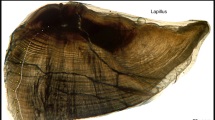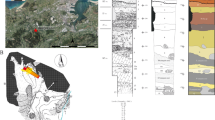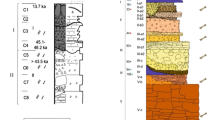Abstract
RECENT detailed investigations of the life-histories of several arctic and antarctic phocids1–3 have established the use of incremental layers in the dentine and cementum of canine teeth as accurate indicators of age. Such studies have relied on seasonal differences in the rate and type of deposition for determining the annual nature of the layers, but so far as we are aware, the results obtained have never been validated by examination of teeth from an animal of known age.
This is a preview of subscription content, access via your institution
Access options
Subscribe to this journal
Receive 51 print issues and online access
$199.00 per year
only $3.90 per issue
Buy this article
- Purchase on Springer Link
- Instant access to full article PDF
Prices may be subject to local taxes which are calculated during checkout
Similar content being viewed by others
References
Fisher, H. D., Fish. Res. Board Canada, MS. Rep. Series (Biological), 588 (1954).
Laws, R. M., Falkland Inlands Dependencies Sci. Rep., 8 (1953).
McLaren, I. A., Fish. Res. Board Canada, Bull. 118 (1958).
Author information
Authors and Affiliations
Rights and permissions
About this article
Cite this article
MANSFIELD, A., FISHER, H. Age Determination in the Harbour Seal, Phoca vitulina L.. Nature 186, 92–93 (1960). https://doi.org/10.1038/186092a0
Issue Date:
DOI: https://doi.org/10.1038/186092a0
This article is cited by
-
Intraspecific differences in the diet of Kuril harbor seals (Phoca vitulina stejnegeri) in Erimo, Hokkaido, using DNA barcoding diet analysis
Mammal Research (2021)
-
Resource partitioning between Pacific walruses and bearded seals in the Alaska Arctic and sub-Arctic
Oecologia (2017)
-
Parasites in harbour seals (Phoca vitulina) from the German Wadden Sea between two Phocine Distemper Virus epidemics
Helgoland Marine Research (2007)
-
Age Determination of Seals
Nature (1960)
Comments
By submitting a comment you agree to abide by our Terms and Community Guidelines. If you find something abusive or that does not comply with our terms or guidelines please flag it as inappropriate.



